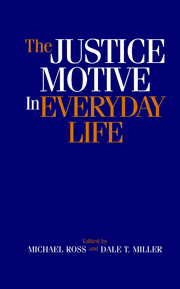Book contents
- Frontmatter
- Contents
- List of Contributors
- Introduction
- Theoretical Perspectives on the Justice Motive
- Victim Derogation and the Belief in a Just World
- The Justice Motive and Prosocial Behavior
- 11 Just World, Social Responsibility, and Helping Behavior
- 12 Policies to Redress Social Injustice: Is the Concern for Justice a Cause Both of Support and of Opposition?
- 13 Justice and Empathy: What Motivates People to Help Others?
- 14 The Justice Motive and Altruistic Helping: Rescuers of Jews in Nazi-Occupied Europe
- 15 Acting Righteously: The Influence of Attitude, Moral Responsibility, and Emotional Involvement
- Justice-Based Reactions to Transgressors
- Justice and Reaction to One's Own Fate
- Name Index
- Subject Index
12 - Policies to Redress Social Injustice: Is the Concern for Justice a Cause Both of Support and of Opposition?
Published online by Cambridge University Press: 08 September 2009
- Frontmatter
- Contents
- List of Contributors
- Introduction
- Theoretical Perspectives on the Justice Motive
- Victim Derogation and the Belief in a Just World
- The Justice Motive and Prosocial Behavior
- 11 Just World, Social Responsibility, and Helping Behavior
- 12 Policies to Redress Social Injustice: Is the Concern for Justice a Cause Both of Support and of Opposition?
- 13 Justice and Empathy: What Motivates People to Help Others?
- 14 The Justice Motive and Altruistic Helping: Rescuers of Jews in Nazi-Occupied Europe
- 15 Acting Righteously: The Influence of Attitude, Moral Responsibility, and Emotional Involvement
- Justice-Based Reactions to Transgressors
- Justice and Reaction to One's Own Fate
- Name Index
- Subject Index
Summary
As documented by the research in the current volume, people are profoundly affected by social injustice. Fortunately, efforts to remedy many forms of social injustice have been undertaken by our legal and political institutions. Yet, despite many well-intentioned efforts to remedy injustice at the societal level, a paradox exists: Often the policies designed to redress injustice are themselves criticized as unfair and, in turn, are opposed. As a result, there is mounting polarization at the societal level in terms of support for, or opposition to, the policies designed to redress social injustice. There is also a rising divergence of opinion among researchers in the psychological literature, due to evidence demonstrating that there are both possible benefits (see Crosby & VanDeVeer, 2000) and burdens (e.g., Heilman, Block, & Lucus, 1992) associated with such policies. In the hope of closing the chasm, we believe that it is necessary to better understand the basis of this paradox. As society diversifies and people question what is or is not fair, research in this vein is especially relevant. In one line of research at the University of Waterloo, we have been investigating the basis of the paradox, following in the tradition of Mel Lerner, both theoretically and methodologically. Theoretically, our overarching approach derives from what is perhaps Lerner's central legacy: his firm conviction that people have a fundamental or core justice motive (Lerner, 1974; Lerner, 1977; Lerner, 1980; Lerner & Lerner, 1981; Lerner & Miller, 1978).
- Type
- Chapter
- Information
- The Justice Motive in Everyday Life , pp. 204 - 225Publisher: Cambridge University PressPrint publication year: 2002
- 11
- Cited by

